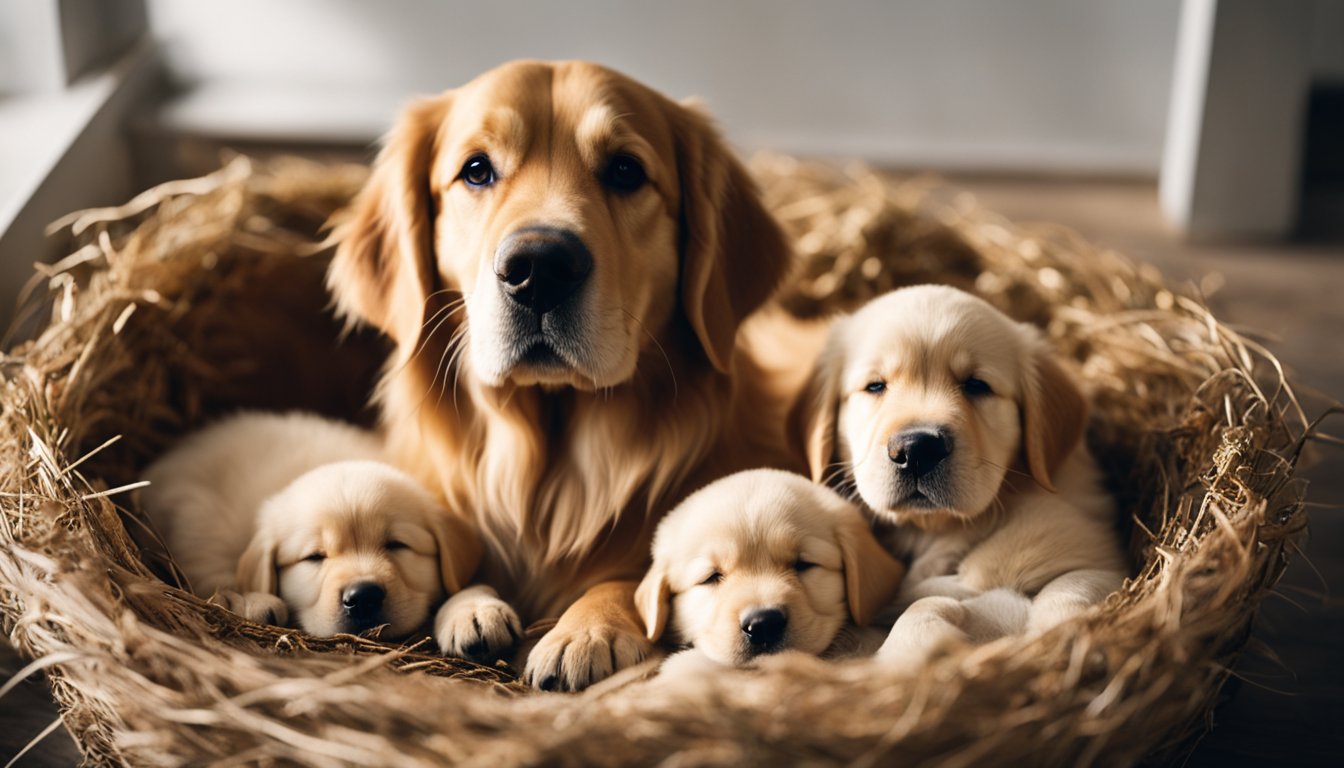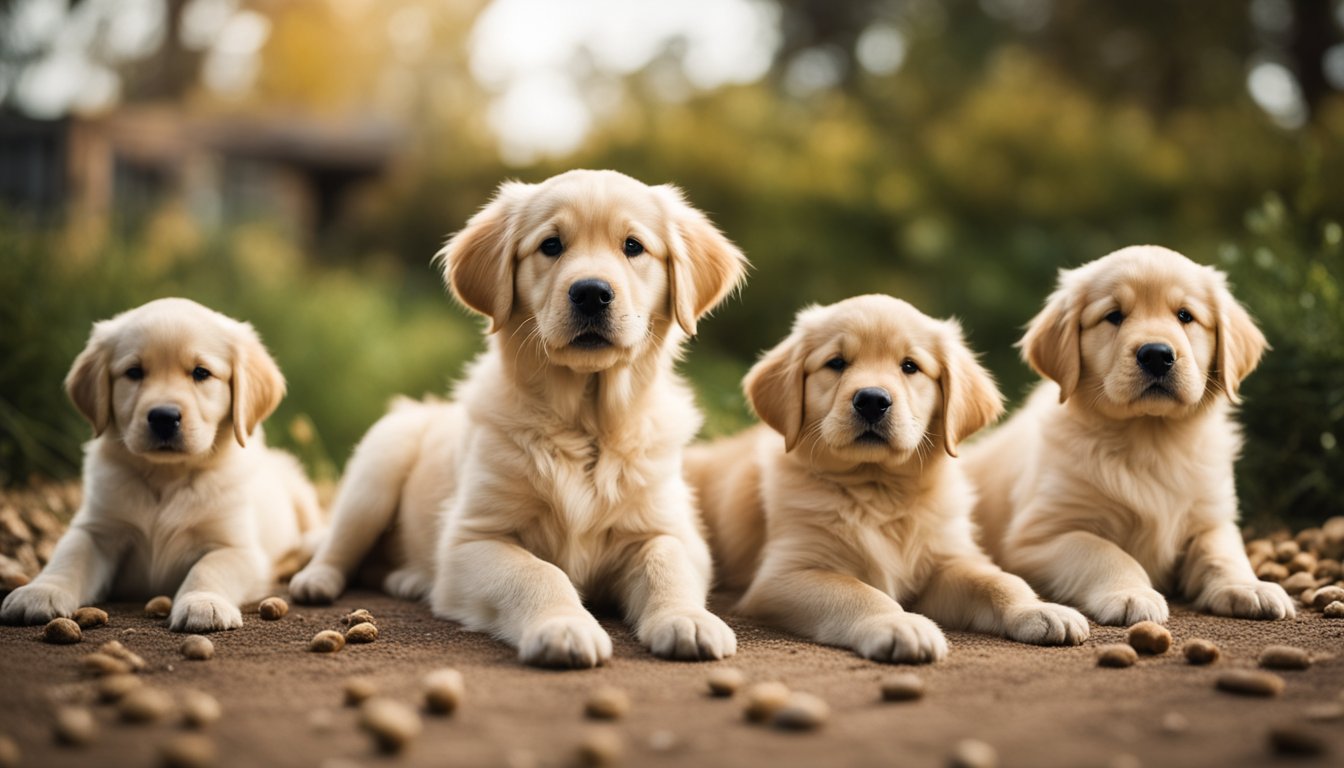Golden Retrievers are one of the most popular dog breeds in the world, known for their friendly and loyal temperament. If you are considering breeding or adopting a Golden Retriever, it is important to understand their average litter size. This information will help you prepare for the number of puppies you can expect and ensure that you provide the necessary care for them.
On average, Golden Retrievers have a litter size of around 8 puppies, but this can vary depending on several factors. Understanding these factors can help you anticipate the size of the litter and prepare accordingly. Factors that can influence litter size include genetics, age, health, and nutrition. Proper care and attention during pregnancy can also play a significant role in litter size.
In this article, we will explore the average litter size for Golden Retrievers and the factors that can influence it. We will also discuss the role of nutrition and care in supporting a healthy litter and provide breeding considerations and comparisons to other breeds. Lastly, we will answer some frequently asked questions about Golden Retriever litters.
Key Takeaways
- Golden Retrievers have an average litter size of around 8 puppies, but this can vary based on several factors such as genetics, age, health, and nutrition.
- Proper care and attention during pregnancy can significantly impact litter size and the health of the puppies.
- Understanding the factors that influence litter size and providing the necessary care and nutrition can help ensure a healthy litter.
Understanding Golden Retriever Litters
https://www.youtube.com/watch?v=bzqSOUw76go&embed=true
Golden Retrievers are known for their friendly and loyal nature, and many people love them for their adorable puppies. If you are planning to breed your Golden Retriever, it is essential to understand the average litter size and other important factors that affect the litter.
How Many Puppies Do Golden Retrievers Have?
The average litter size for Golden Retrievers is between 6 to 8 puppies, but it can vary from four to twelve puppies ZooNerdy. The size of the litter depends on various factors such as the age, size, and health of the mother. Younger dogs tend to have smaller litters, while older dogs may have larger litters ZooNerdy.
First Litter vs. Subsequent Litters
If your Golden Retriever is having her first litter, the litter size may be smaller than her subsequent litters. On average, first-time mothers have smaller litters than experienced mothers I Heart Goldens. However, this may not always be the case, and some first-time mothers may have larger litters.
How Many Litters Can a Golden Retriever Have?
Golden Retrievers can have several litters in their lifetime, but it is essential to take their health and age into consideration. It is recommended to breed your Golden Retriever after she is two years old and not breed her after she is five years old AKC. Breeding your Golden Retriever too frequently can lead to health problems and may reduce the litter size.
In conclusion, understanding Golden Retriever litters is essential if you plan to breed your dog. The average litter size for Golden Retrievers is between 6 to 8 puppies, and it can vary depending on various factors. It is recommended to breed your Golden Retriever after she is two years old and not breed her after she is five years old to ensure her health and the health of her puppies.
Factors Influencing Litter Size
https://www.youtube.com/watch?v=MoB5OgiZxug&embed=true
There are several factors that can influence the litter size of a Golden Retriever. These factors include the age and health of the mother, genetics, and whether the mother is a first-time or experienced mother. In this section, we will explore these factors in more detail.
Age and Health of the Mother
The age and health of the mother can significantly impact the litter size of Golden Retrievers. Generally, younger mothers tend to have smaller litters, while older mothers tend to have larger litters. This is because older mothers may have a higher chance of producing more eggs during ovulation. Additionally, the health of the mother can also affect litter size. Mothers who are unhealthy or have underlying health conditions may have smaller litters.
Genetics
Genetics can play a significant role in determining the litter size of Golden Retrievers. The genetic makeup of the parents can influence the number of puppies in a litter. If both parents come from a line of dogs that typically have smaller litters, then it is more likely that the litter size will be smaller. Similarly, if both parents come from a line of dogs that typically have larger litters, then it is more likely that the litter size will be larger.
First-Time Mothers vs. Experienced Mothers
First-time mothers may have smaller litters compared to experienced mothers. This is because first-time mothers are still adjusting to the process of giving birth and may not produce as many eggs during ovulation. Experienced mothers, on the other hand, have been through the process before and may produce more eggs during ovulation, resulting in larger litters.
Other Factors Affecting Litter Size
Other factors that can affect the litter size of Golden Retrievers include the breeding method and diet. Breeding methods such as artificial insemination or natural breeding can influence the number of puppies in a litter. Additionally, a proper diet and care during pregnancy can also impact litter size.
On average, Golden Retrievers have around six to ten puppies per litter, but this can range from four to twelve. It is important to note that the litter size can vary greatly depending on the factors mentioned above.
Role of Nutrition and Care
« Why Do Dogs Howl: Understanding the Reasons Behind This Common Behavior
Best Age to Breed a Golden Retriever: Tips and Guidelines »
Nutrition and care play a crucial role in the litter size of Golden Retrievers. Proper nutrition and care ensure that the mother is healthy and able to carry the puppies to full term. Here are some tips to ensure that your Golden Retriever has the best possible chance of having a healthy litter:

-
Diet: A healthy diet is essential for a healthy pregnancy. Make sure your Golden Retriever is getting a balanced diet that is rich in vitamins, minerals, and protein. Consult with your veterinarian to determine the best diet for your dog.
-
Exercise: Regular exercise is important for maintaining your dog’s health during pregnancy. However, it is important to avoid over-exertion, especially in the later stages of pregnancy.
-
Vaccinations: Make sure your Golden Retriever is up-to-date on all of her vaccinations before breeding. This will help prevent the spread of diseases to the puppies.
-
Check-ups: Regular check-ups with your veterinarian are important to monitor the health of your Golden Retriever during pregnancy. Your veterinarian can also provide advice on proper nutrition and care.
-
Vitamins and Minerals: Supplements can be beneficial for pregnant dogs, but it is important to consult with your veterinarian before giving your dog any supplements. Some vitamins and minerals, such as calcium, can be harmful if given in excess.
-
Additives and Fillers: Avoid dog foods that contain additives and fillers, as these can be harmful to pregnant dogs and their puppies.
By following these tips, you can help ensure that your Golden Retriever has a healthy pregnancy and litter. Remember, proper nutrition and care are essential for the health of both the mother and her puppies.
Breeding Considerations
Breeding Golden Retrievers is a significant responsibility and requires careful consideration. When choosing a mate for your dog, you need to take into account several factors, including the breed, gene pool, and potential mate’s health status.
It is essential to avoid inbreeding as it can lead to genetic defects in the puppies. You should also ensure that the potential mate is healthy and free of any genetic disorders that may be passed on to the offspring.
When breeding Golden Retrievers, it is crucial to maintain genetic diversity to prevent the emergence of hereditary health issues. You can achieve this by selecting mates from different bloodlines and avoiding breeding dogs with similar genetic backgrounds.
As a breeder, you should also consider the size of the litter. On average, Golden Retrievers have around eight puppies per litter, but this can vary from four to twelve. Overbreeding can lead to health problems for both the mother and the puppies. Therefore, it is essential to limit the number of litters per year and allow sufficient time for the mother to recover between litters.
In conclusion, breeding Golden Retrievers requires careful consideration and planning. By selecting a mate with a diverse genetic background and ensuring that they are free of any genetic disorders, you can produce healthy puppies with a friendly temperament.
Comparisons and Records
When it comes to breeding Golden Retrievers, it’s always interesting to compare their litter size to other breeds or to see how many puppies were born in a single litter. While there is no official Guinness World Record for the largest litter size for Golden Retrievers, the average litter size for this breed is between six to ten puppies I Heart Goldens. However, some Golden Retrievers have been known to have litters as large as 14 puppies Golden Retriever News.
To put this into perspective, the Neapolitan Mastiff holds the record for the largest litter size, with a whopping 24 puppies born in a single litter Guinness World Records. Bulldogs and Rottweilers are also known to have large litter sizes, with an average of 6 to 7 puppies per litter AKC, AKC.

It’s worth noting that litter size can vary depending on a variety of factors, including genetics, age, and health of the mother. It’s important to keep in mind that not all Golden Retrievers will have the same litter size, and some may have smaller or larger litters than the average.
Overall, while Golden Retrievers may not hold the record for the largest litter size, they are still known for producing healthy litters with an average size of six to ten puppies.
Frequently Asked Questions
https://www.youtube.com/watch?v=aLiXVlV5-wE&embed=true
What is the average litter size for Golden Retrievers?
The average litter size for Golden Retrievers is between 6 and 10 puppies, but this can vary based on the particular dog’s genetics. [1]
How many puppies do Golden Retrievers have in their first litter?
Golden Retrievers usually have a smaller litter size in their first litter, which can range from 1 to 4 puppies. However, this can also depend on the age and health of the dog. [1]

How many litters are safe for Golden Retrievers to have?
It is recommended that female Golden Retrievers should not have more than 3 litters in their lifetime. This is to ensure their overall health and well-being. [1]
Which dog breed has the largest litter size?
The breed with the largest litter size is the Neapolitan Mastiff, with an average litter size of 10-12 puppies. [2]
How many puppies can a small dog have?
Small dogs typically have smaller litters, with an average of 3-5 puppies. However, this can vary based on the breed and individual dog. [2]
Is the first puppy of the litter always the best?
No, the first puppy of the litter is not always the best. Each puppy has its own unique personality and traits, and it is important to evaluate each one individually when choosing a new pet. [3]











